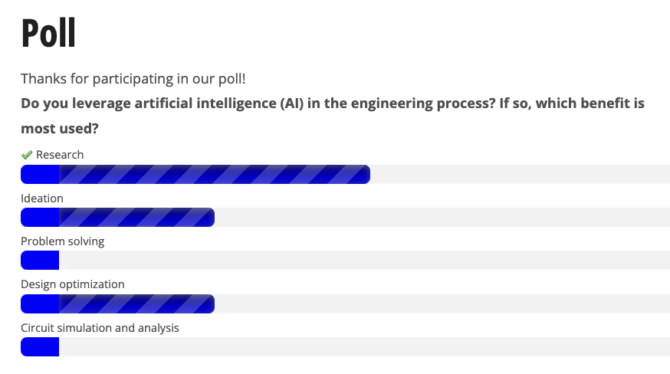
Canadian electronic designers enjoy various AI benefits
Stephen Law
Automation / Robotics Electronics Engineering Software Engineering AI artificial designer engineering intelligenceEP&T poll results demonstrate attributes most sought after with artificial intelligence
In an online poll being conducted by EP&T, engineers are weighing in on the transformative impact of artificial intelligence (AI) in the electronic engineering space. The survey puts focus on various aspects of AI implementation, with a particular attention to its role in predictive maintenance, a technology that has been revolutionizing the industry.
Predictive maintenance – A game-changer
One of the most significant revelations from the survey is the widespread adoption of AI for predictive maintenance in designing an electronic design. By utilizing machine learning algorithms, engineers can now predict potential failures in devices or systems, leading to a substantial reduction in unexpected breakdowns and downtime.

Source: EP&T
AI’s ability to analyze data from sensors and equipment empowers engineers to identify and address potential issues before they escalate into major problems. This proactive approach not only saves valuable time, but also significantly cuts down on costs associated with repairs and maintenance.
Survey results: Research tops the list
EP&T’s online poll results demonstrated a notable 50% of respondents identified ‘research’ as the primary advantage of integrating AI into their engineering processes. This highlights the significance of AI in enabling engineers to conduct in-depth research, explore new possibilities, and stay ahead in a rapidly evolving field.
Ideation & design optimization
Following closely behind, the benefits of ‘ideation’ and ‘design optimization’ garnered substantial support, with 30% approval from the respondents. This suggests that engineers are embracing AI as a tool to enhance their creative processes and streamline design optimization, ultimately leading to more efficient and effective solutions.
The survey also showed that ‘problem solving’ and ‘circuit simulation & analysis’ rounded out the results with 5% approval each. While these aspects may not have taken the spotlight, the acknowledgment of their significance suggests a diverse range of applications for AI in electronics engineering.
To view the results or participate in the poll online, click here:
